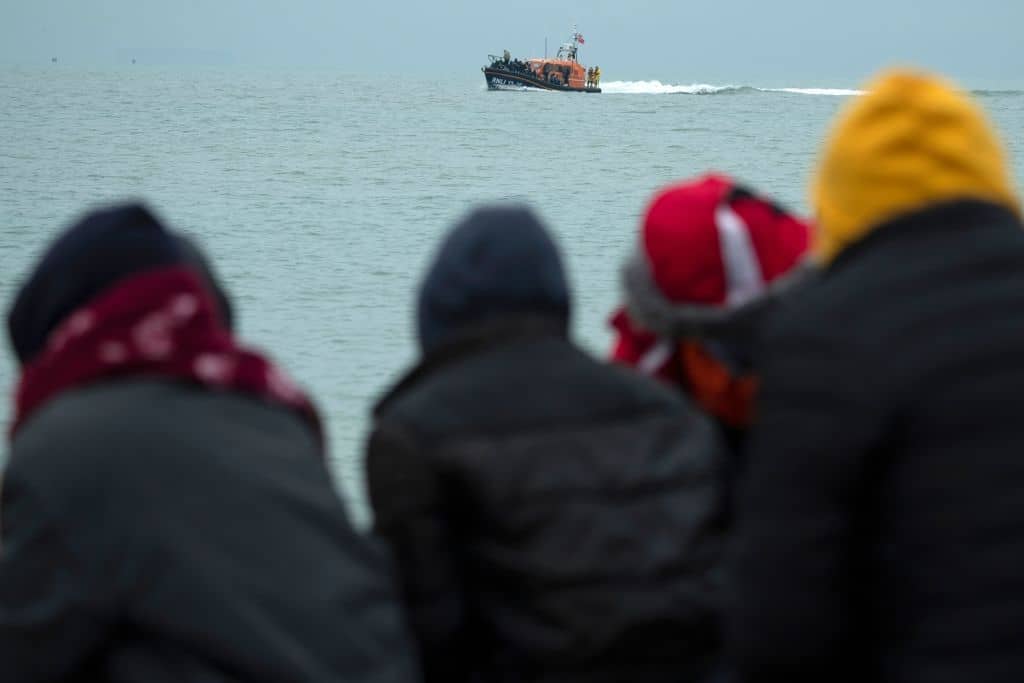The tragic drowning of more than two dozen people in the English Channel yesterday should remind us that closing down this irregular migration route has become a multi-purpose moral duty. Not only does the British state have a responsibility to do so to preserve its social contract with its citizens and the integrity of the nation, but also to protect lives.
The large-scale loss of life that took place was the proverbial accident that had been waiting to happen. There has been a spate of smaller-scale drownings in recent weeks and it was only a matter of time before a fully laden, sizeable inflatable capsized or sank.
Boris Johnson reacted to the tragedy by finally calling a Cobra meeting to discuss immediate action to prevent a repeat. The French authorities made several arrests of suspected people traffickers. It’s amazing what can be done when inertia is no longer an option.
So where is this tragic story heading and how can Johnson get ahead of events rather than bumbling along behind them as he has done for so long?
The large-scale loss of life that took place was the proverbial accident that had been waiting to happen
As a long-time close observer of this issue, the most likely way for things to pan out given the personalities of the key players involved strikes me as short-term improvement followed by the onset of sharp further deterioration next spring.
The French authorities have clearly been chastened, especially given reports in recent days of their police standing by and watching migrants put to sea, and the fact that these drownings occurred so close to the coast of France.
Our beleaguered Home Secretary Priti Patel has meanwhile shown a repeated readiness to trust in the prospect of joint Anglo-French action making the route unviable. And Johnson himself has relied on the idea of this being a nut that can only be cracked if France does far more.
We can expect genuine close cooperation between the two countries in the immediate aftermath of this tragedy. Combined with the onset of winter weather and choppier seas, it would be surprising if this did not reduce the volume of crossings substantially.
Yet if Johnson and Patel rely on these factors carrying on indefinitely they will sleepwalk into an even worse phase of the crisis next spring. Then a series of disputes between France and the UK will feature heavily in the French presidential election, giving president Macron a strong incentive to use fair means and foul to put pressure on the Johnson regime. Better weather and the arrival of hundreds of larger inflatables believed to be under manufacture in Turkey could see the scale of crossings explode.
There is another way ahead, but it would require from Johnson the kind of resilience, focus and readiness to fly through establishment flak that he has not displayed since winning the epic battle for Brexit in late 2019. It is not Labour’s solution of creating safe passage for the young men who make their way to the coast of France. That would simply create an enormous new pull factor and ultimately prove the wisdom of Milton Friedman’s observation that a country can have a welfare state or open borders, but it cannot have both.
No, the way forward is to implement a policy that Australian prime minister Scott Morrison once described as ‘taking the sugar off the table’. In the present context this means moving to a system of standard offshore processing of asylum applicants who land illegally with a heavy presumption towards ultimately turning them down.
Doing so may require the UK withdrawing from one or more of the following: the 1951 Geneva Refugee Convention, the European Convention of Human Rights, the jurisdiction of the European Court of Human Rights and the 2018 Global Compact for Migration. Our own Human Rights Act may also need substantial amendment. Justice Secretary Dominic Raab will be well placed to advise the PM on necessary steps.
Such action would no doubt see a wave of liberal establishment outrage unleashed, with the left and its media cheerleaders seeking to portray the UK as a pariah state and Johnson as leading a renegade regime. But if it sounds draconian or unconscionable then consider this quote:
‘On asylum, a Conservative Government will not allow outdated and inflexible rules to prevent us shaping a system which is more humane, more likely to improve community relations and better managed. So we will take back powers from Brussels to ensure national control of asylum policy, withdraw from the 1951 Geneva Convention and work for modernised international agreements. Our objective is a system where we take a fixed number of refugees from the UNHCR rather than simply accepting those who are smuggled to our shores. Asylum seekers’ applications will be processed outside Britain.’
That’s what the Conservative manifesto pledged way back in 2005, when Michael Howard QC – a serious and heavyweight lawyer – was party leader. Back then the liberal establishment retained the power to shut down an honest debate on migration and the Howard agenda did not carry the country against Tony Blair.
Since then we have had Brexit, motivated by a heightened desire to take back control of our borders. The UK is no longer restrained by free movement obligations with the EU, but the asylum system remains entangled in a thicket of outdated global agreements.
In this era of immense and growing migratory flows, motivated far more often by materialist considerations than specific acts of persecution, the present arrangements are unsustainable. If Johnson is not the man to take on the immense challenge of defeating a left establishment increasingly hostile to the idea of self-governing nation states and in thrall to the notion of ‘no borders’ he will find Nigel Farage stepping back into politics to smash the Tory poll score once again. And then whoever becomes Tory leader will have to do it anyway. In other words, this is the new Brexit.







Comments